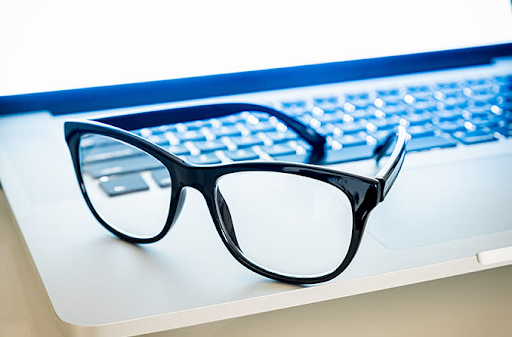
Photo source: https://www.allaboutvision.com/eyeglasses/blue-light-glasses/
Did you know that the average American spends 13+ hours on screens per day? With the new routines we’ve had to settle in due to COVID-19, adjusting to increased screen time is just one of many changes. Long days spent staring at computer screens have us experiencing blurred vision, dry eyes, headaches, poor sleep, and reduced productivity. Furthermore, there is a growing concern about increased blue light exposure, which has been linked to these symptoms as well as other potential health impacts. In today’s blog post, we’ll explore what blue light is, how it can affect us, and what we should do about it.
What Is Blue Light?
Blue light makes up a portion of the visible light spectrum and plays a role in regulating our alertness, hormone production, and circadian rhythms (or sleep cycles). It is a low wavelength, high energy light that has the potential to penetrate into deeper layers of eye tissue and cause damage to the retina. Common sources of blue light include LED lights, fluorescent lights, and many digital devices such as smartphones, computer screens, tablets, and video game consoles. Normally, our main source of blue light is from the sun, but longer days on screens has increased our daily exposure.

- Picture source: https://exyra.com.au/pages/bluelight
Blue Light And Sleep
Light is the most important factor in regulating our circadian rhythms, which are responsible for vital functions including regulating sleep/wake cycles, hormone release, eating habits, digestion, and body temperature. Before the age of smartphones and computers, these rhythms followed closely with sunrise and sunset. However, the increased usage of digital devices, especially at night, exposes us to more blue light and plays a big role in disrupting our circadian rhythms. This results in difficulty sleeping at night and grogginess during the day.
Is Blue Light Harmful?
Long hours of blue light exposure has been shown to disrupt our sleep cycles by delaying melatonin release, but it can also exacerbate dry eye and eyestrain in some individuals. But while blue light may make us feel less rested during the day, it isn’t exactly harmful in the short-term.
When it comes to the effects of long-term blue light exposure, however, there is not enough scientific evidence that says it causes irreversible retinal damage. Studies are underway and we are still learning more about the long-term effects of blue light on human eyes.
So does this mean it’s okay to keep spending long hours in front of our computer screens and phones? The answer is yes and no. Even though we need more data on the long-term effects of blue light on our eyes, the growing concerns about its potentially harmful cumulative effects are still valid. We are often in very close proximity to our screens, in some cases just a handful of inches. Time spent on screens has also drastically increased over time, particularly for kids, whose eyes absorb more blue light than adults. Check out the tips below to find out what we can do in the meantime to protect our eyes and prevent long-term damage.
How Can I Protect My Eyes?
-
- Wear blue blocking glasses with a yellow tint to reduce blue light and increase contrast on screens.
- Add blue light filtering anti-reflective coatings to your prescription eyewear (we recommend Crizal Prevencia).
- Use night mode on your devices or download apps that filter blue wavelengths.
Apple: Night Shift (on your iPhone or iPad, select Settings > Display & Brightness)
Android: f.lux, Twilight, Blue Light Filter
- Take frequent breaks when working on a computer to give your eyes some rest. Try practicing the 20-20-20 rule (for every 20 minutes on a screen, look at something 20 feet away for 20 seconds) – check out Dr. Kim’s video here.
- Reduce overall screen time, especially at night. Aim to not use any digital devices at least 2 hours before bedtime.
- Use preservative-free artificial tears throughout the day. Our office recommends Oasis Tears Plus Preservative-Free Lubricant Eye Drops.
Questions? Feel free to contact our office for more information or make an appointment with our optical to find the best eyewear solutions for you.
Dr. Stella Ma


